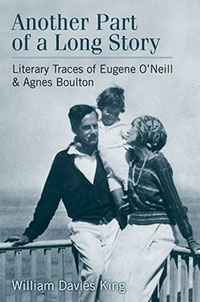![]()
 |
Another Part of a Long Story Literary Traces of Eugene O'Neill
William Davies King |
|
|
|
Biographers of American playwright Eugene O'Neill
have been quick to label his marriage to actress Carlotta Monterey
as the defining relationship of his illustrious career. But in doing
so, they overlook the woman whom Monterey replaced—Agnes Boulton,
O'Neill's wife of over a decade and mother to two of his children.
O'Neill and Boulton were wed in 1918—a time when she was a
successful pulp novelist and he was still a little-known writer of
one-act plays. During the decade of their marriage, he gained fame
as a Broadway dramatist who rejected commercial compromise, while
she mapped that contentious territory known as the literary
marriage. His writing reflected her, and hers reflected him, as they
tried to realize progressive ideas about what a marriage should be.
But after O'Neill left the marriage, he and new love Carlotta
Monterey worked diligently to put Boulton out of sight and mind—and
most O'Neill biographers have been quick to follow suit. |
|
© Copyright 1999-2016 eOneill.com |